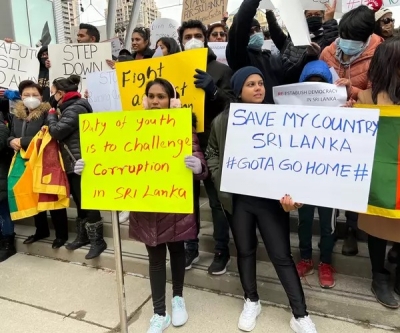Beijing: After weeks of dithering to respond to calls for help from crisis-hit Sri Lanka, China, whose large loans and investments to the island nation led to allegations of debt diplomacy, has said it will provide “emergency humanitarian assistance” to Colombo, but remained silent on its plea for debt rescheduling.
The Chinese government has decided to provide emergency humanitarian assistance to Sri Lanka to help the country cope with the current difficulties, Xu Wei, a spokesperson for China International Development Cooperation Agency, said.
China has noticed Sri Lanka’s economic difficulties, Xu said, adding that as a traditional friendly neighbour to Sri Lanka, the Chinese government has decided to provide emergency humanitarian assistance to the country to help it cope with the current difficulties, state-run Xinhua news agency quoted Xu as saying on Tuesday.
On Wednesday, the Chinese Foreign Ministry spokesman Wang Wenbin repeated the same at a media briefing here, adding that the “Chinese side has announced that it will provide emergency humanitarian assistance to Sri Lanka.”
“We will continue to offer support and assistance to the best of our capability to help Sri Lanka reinvigorate its economy and improve people’s livelihood,” he said.
Sri Lanka is grappling with unprecedented economic turmoil since its independence from Britain in 1948. The crisis is caused in part by a lack of foreign currency, which has meant that the country cannot afford to pay for imports of staple foods and fuel, leading to acute shortages and very high prices.
The island nation is witnessing large-scale protests against the government’s handling of the debt-ridden economy – the worst-ever economic crisis in the country’s history.
On Monday, Sri Lanka sought Rapid Financing Instrument (RFI) from the IMF to immediately bailout the country from the quagmire of economic crisis.
Saddled with a huge forex crisis, Sri Lanka on April 12 announced a pre-emptive default of all its foreign debt totalling USD 51 billion as a “last resort” and emergency measure.
While China dithered, India has extended assistance of about USD 2.5 billion in the past three months to Sri Lanka, including credit facilities for fuel and food and reportedly considering another USD two billion aid to assist the island nation in crisis.
Both Xu and Wang, however, have not provided any details of China’s humanitarian aid.
Earlier reports said China offered shipments of rice to Sri Lanka citing the Rubber-Rice Pact which was signed in 1952 under which China supplied rice and imported rubber from Colombo.
So far, Beijing remained silent on Chinese Ambassador to Colombo Qi Zhenhong’s announcement last month that China is considering a USD 2.5 billion credit facility to Sri Lanka.
Also China has so far parried questions on Sri Lankan President Gotabaya Rajapaksa’s request made to Chinese Foreign Minister Wang Yi during his visit in December last year to restructure Colombo’s debt repayments to bailout his government.
It is estimated that Sri Lanka owes debt payments to China to the tune of about USD 1.5 to 2 billion this year. Over all China’s loans and investments in Sri Lanka was estimated to be more than USD eight billion in the last few years.
While maintaining silence on Sri Lanka’s debt deferment, China has quietly cleared Pakistan’s request for USD 4.5 billion loan deferment last month. The deferment was announced by former Pakistan Foreign Minister Shah Mehmood Qureshi during his visit to China on March 30. Diplomatic sources here say China informed Sri Lanka about its reservations on debt deferment, saying there is no such provision in their financial system; instead may consider providing loans to repay debt due to it perhaps with stricter conditionality.
Chinese loans to Sri Lanka reportedly accounts for about 10 per cent of its external debt covering huge infrastructure projects such as the Hambantota port, which China obtained for 99-year lease as debt swap, drawing international flak with allegations of debt diplomacy, trapping smaller countries with huge loans and projects under its Belt and Road Initiative (BRI).
China is reportedly concerned as besides Sri Lanka, other BRI signatories Pakistan and Nepal in South Asia too faced financial crisis with massive forex crisis looking for international bailouts.
According to a study by AidData, a US data research lab, Chinese loans account for 65 per cent of bilateral debt, worth hundreds of billions of dollars across Africa, Eastern Europe, Latin America and Asia.
Commenting on China’s dilemma on providing bailouts, Ganeshan Wignaraja, a senior fellow at the National University of Singapore, said Beijing was likely to be reluctant to step in.
“China does not want to lose money,” he said. “If China gives Sri Lanka a special bailout, other countries in the Belt and Road Initiative that are in similar difficulties will ask for the same type of assistance,” he told Hong Kong-based South China Morning Post recently.
But Colombo’s decision to suspend payments on its external debts will put pressure on Beijing to be part of the international assistance to Sri Lanka, Wignaraja said. Wignaraja said helping Sri Lanka would be a way to address the debt-trap accusations. “Otherwise the label will stick,” he said.
“If China behaves like a bank, it will make this debt problem much worse than the debt trap and it will actually become a Chinese problem,” Wignaraja said. He also said China should look at a country’s “debt situation” when it extends loans. “It must not over-give money on commercial interest rates so that countries have the risk of a debt trap like Sri Lanka now has fallen into. So China has a moral, and a legal and developmental obligation,” he said.
PTI







































